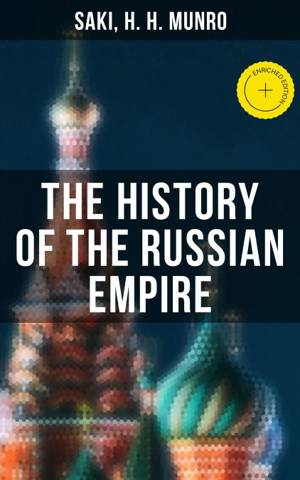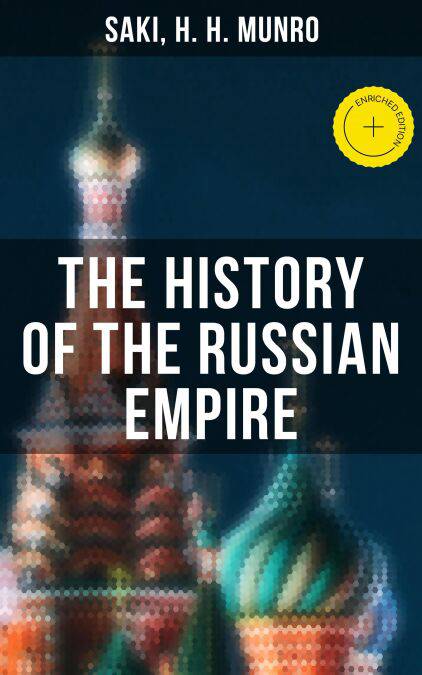
- Afhalen na 1 uur in een winkel met voorraad
- Gratis thuislevering in België vanaf € 30
- Ruim aanbod met 7 miljoen producten
- Afhalen na 1 uur in een winkel met voorraad
- Gratis thuislevering in België vanaf € 30
- Ruim aanbod met 7 miljoen producten
Zoeken
The History of the Russian Empire E-BOOK
Enriched edition. From the Foundation of Kievian Russia to the Rise of the Romanov Dynasty
Saki, H. H. Munro
E-book | Engels
€ 0,99
Uitvoering
Omschrijving
'The History of the Russian Empire' is a vibrant anthology that vividly encapsulates the multifaceted narrative of Russia's grand historical tapestry through the prismatic lens of Saki (H. H. Munro)'s impeccable prose. This collection profoundly explores themes of power, conflict, and transformation across varied literary styles – from biting satire to deep socio-political analysis. Saki's renowned wit and sharp observation provide a unique exploration of Russia's imperial past, presenting a panorama that is as enlightening as it is engaging. Esteemed for his brilliance in the short story format, Saki's works included in this anthology stand as testaments to his literary genius and deep understanding of human nature and societal dynamics. The backgrounds of Saki, a master of Edwardian literature, and his works resonate deeply with significant historical and cultural undercurrents of his time. Moving from his acute mockery of the societal norms to the critical dissection of authoritarian rule, the anthology connects readers with the broader European literary movements of the early 20th century, enriching the understanding of the period's geopolitical and social turmoil. This anthology is essential for those who wish to delve into the complexities of Russian history through the lens of a literary giant. Readers will benefit from the diverse perspectives and narrative styles that Saki masterfully employs to discuss historical events. Engaging with this anthology promises not only an educational journey but also a profound appreciation of how literature mirrors and critiques the ebbs and flows of an empire. It is a scholarly treasure that prompts meaningful reflection and discussion among enthusiasts of history and literature alike.
In this enriched edition, we have carefully created added value for your reading experience:
- A succinct Introduction situates the work's timeless appeal and themes.
- The Synopsis outlines the central plot, highlighting key developments without spoiling critical twists.
- A detailed Historical Context immerses you in the era's events and influences that shaped the writing.
- A thorough Analysis dissects symbols, motifs, and character arcs to unearth underlying meanings.
- Reflection questions prompt you to engage personally with the work's messages, connecting them to modern life.
- Hand‐picked Memorable Quotes shine a spotlight on moments of literary brilliance.
- Interactive footnotes clarify unusual references, historical allusions, and archaic phrases for an effortless, more informed read.
In this enriched edition, we have carefully created added value for your reading experience:
- A succinct Introduction situates the work's timeless appeal and themes.
- The Synopsis outlines the central plot, highlighting key developments without spoiling critical twists.
- A detailed Historical Context immerses you in the era's events and influences that shaped the writing.
- A thorough Analysis dissects symbols, motifs, and character arcs to unearth underlying meanings.
- Reflection questions prompt you to engage personally with the work's messages, connecting them to modern life.
- Hand‐picked Memorable Quotes shine a spotlight on moments of literary brilliance.
- Interactive footnotes clarify unusual references, historical allusions, and archaic phrases for an effortless, more informed read.
Specificaties
Betrokkenen
- Auteur(s):
- Uitgeverij:
Inhoud
- Aantal bladzijden:
- 299
- Taal:
- Engels
Eigenschappen
- Productcode (EAN):
- 9788027243716
- Verschijningsdatum:
- 1/11/2018
- Uitvoering:
- E-book
- Beveiligd met:
- Digital watermarking
- Formaat:
- ePub

Alleen bij Standaard Boekhandel
Beoordelingen
We publiceren alleen reviews die voldoen aan de voorwaarden voor reviews. Bekijk onze voorwaarden voor reviews.








